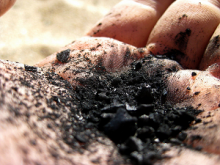Article
In some versions of Navajo traditional medicine, when a person is thought to have been contaminated by coming into contact with an enemy or enemy witch, he can be taken to a diagnostician known as a hand trembler. The hand trembler will determine if the Enemyway ceremony is needed to cure the patient of any ailments thought to derive from enemy contact. The blackening rite is then conducted to determine if the Enemyway Ceremony will cure the patient’s ailment. This rite consists of mixing tallow and ash and spreading the mixture over the cursed victim. By painting the patient in ash, the patient comes to embody Monster Slayer, a young warrior who fights his way toward saving the Navajo people in various tales that comprise the Navajo origin story.
"Charcoal in a hand" by magnold is licensed under CC BY-SA.
Manuscripts
References
Hieb, L. A.
2004 Alexander M. Stephen and the Navajos. New Mexico Historical Review 79 (3): 353-
396.
Lyon, William S.
1996 Encyclopedia of Native American Healing. Santa Barbara: ABC-CLIO.
Vannette, Walter M. and Reed Tso
1988 Navajo Religious Use of the 1934 Reservation Area. Expert Witness Report, Brown
and Bain, PA., Phoenix and the Navajo Nation Department of Justice, Window Rock, AZ.
Wyman, Leland Clifton
1965 The Red Antway of the Navaho. Navajo Religion Series, v. 5. Santa Fe: Museum of
Navajo Ceremonial Art.
Wyman, Leland C.
1983 Navajo Ceremonial System. In Handbook of North American Indians, Vol. 10. A.
Ortiz, ed. Pp. 537, 541. Washington: Smithsonian Institution.

